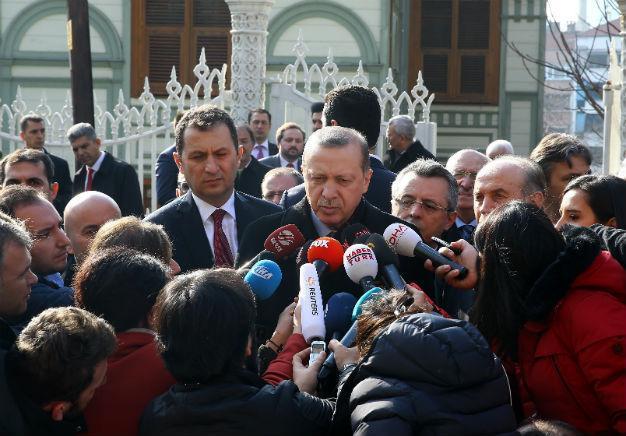Shift to presidential system not personal: Erdoğan
ISTANBUL

AA photo
Turkish President Recep Tayyip Erdoğan has reiterated that shifting to a new presidential system which would equip the Turkish Presidency with more powers was not a personal issue, while speaking to reporters in Istanbul.
“We need that [a shift to a presidential system]. There is a demand of 55 to 60 percent when we look at publicly conducted [polls]. I believe this percentage will increase,” Erdoğan told reporters on Jan. 29, after performing his Friday prayer at a mosque in Istanbul, underscoring that the issue of shifting to a new presidential system was not personal, but rather the public’s will.
“We have our friends, academics, media personnel and non-governmental organizations, who all make comments on this [shift to a new system], taking serious roles,” he said, adding that professors, journalists and representatives from several civil organizations with bearing made efforts to explain what a shift to a new presidential system would mean to the people of Turkey.
“All of them hold panels and conferences across various parts of our country to tell our people [about] this [shift to a new presidential system],” he said, citing presidential systems of the countries such as the United States and South American countries.
The statement came a day after he said the discussion on what he described as “an executive presidential system” was not a matter of personal ambition, but a necessity in a country where the current parliamentary system was “out of date.”
“In building the ‘New Turkey,’ we think Turkey needs an executive presidential system and a new constitution. This discussion should not be presented as a matter of my personal ambition,” he said on Jan. 28, addressing a meeting on the prospects of a new constitution hosted by the Turkey Constitution Platform.
“Our current system is an anomaly. Running this system, where both the prime minister and the president are elected, is exceptionally difficult,” Erdoğan said, adding the current parliamentary system in Turkey was “out of date” and the existing situation, in which both the prime minister and president are elected by the people, was unsustainable.
Emphasizing his wish to hold a referendum over a new constitution and a transition to a presidential system while calling on civil society organizations and media to launch a grassroots campaign to this end, Erdoğan said, “Today, we are working in harmony as a president and a prime minister who came from the same political tradition and who have long worked together.”
Erdoğan had served as prime minister and head of the ruling Justice and Development Party (AKP) from 2003 until elected president in August 2014, after which the party’s current leader, Prime Minister Ahmet Davutoğlu, took over.
“How will this business run tomorrow if the president and the prime minister are from different political mindsets having different priorities?” Erdoğan asked, recalling that such complications were experienced in the early 1990s when Turgut Özal was president and Süleyman Demirel was prime minister.
In the Nov. 1, 2015, election the AKP secured 317 seats in the 550-member parliament. For a constitutional change in parliament, the AKP needed to win 367 seats, though 330 seats would be enough to take the issue to a referendum.
According to a scenario in some media reports, in the event that opposition parties do not support a constitutional change, an early election could be held in which the AKP would aim to win 330 seats, paving the way for a referendum on a presidential system in line with Erdoğan’s desires.
